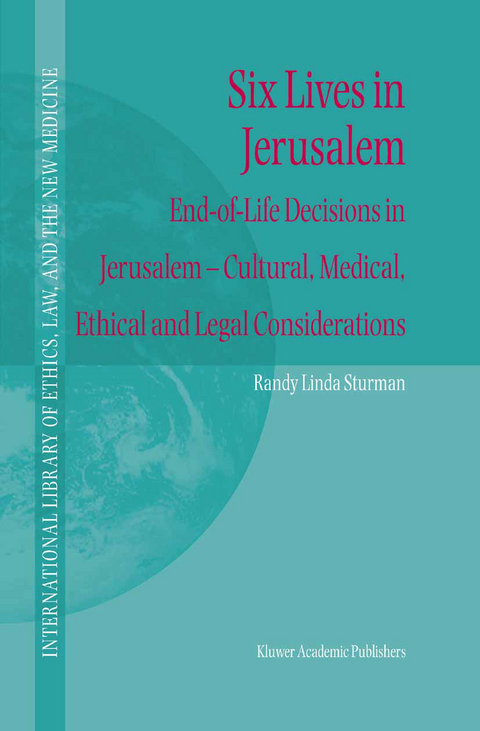
Six Lives in Jerusalem
End-of-Life Decisions in Jerusalem — Cultural, Medical, Ethical and Legal Considerations
Seiten
2004
Springer-Verlag New York Inc.
978-1-4020-1725-4 (ISBN)
Springer-Verlag New York Inc.
978-1-4020-1725-4 (ISBN)
For instance, should a patient with Amyotrophic lateral sclerosis (ALS) who is mentally alert yet unable to move from the neck down be allowed to refuse medical treatment; Is there a difference between not inserting a respirator into a patient who is unable to breathe and not inserting a feeding tube into a patient who is unable to eat?
whether the patient is suffering? Should the ability to think and reason be considered as the most important factor? For instance, should a patient with Amyotrophic lateral sclerosis (ALS) who is mentally alert yet unable to move from the neck down be allowed to refuse medical treatment; and, if so, at what point in her treatment should one consider her life no longer worth living? Is there a difference between not inserting a respirator into a patient who is unable to breathe and not inserting a feeding tube into a patient who is unable to eat? In other words, where does one draw the line between a life worth living and one that is beyond hope, and what criteria should be used? Several of my cases address this issue. 2. What are the religious influences that affect the decision-making process? Israelis all seem to agree that they are a “Jewish state” and that their Jewishness is extremely important to their collective identity; however, they have a difficult time defining what this means. There is a great deal of ambivalence, especially among the less religious, as to what role religion should be allowed to play in their lives. Many resent the control that the religious have over their lives; yet, they also feel that it is beneficial and should play some role in affecting the morals of the country.
whether the patient is suffering? Should the ability to think and reason be considered as the most important factor? For instance, should a patient with Amyotrophic lateral sclerosis (ALS) who is mentally alert yet unable to move from the neck down be allowed to refuse medical treatment; and, if so, at what point in her treatment should one consider her life no longer worth living? Is there a difference between not inserting a respirator into a patient who is unable to breathe and not inserting a feeding tube into a patient who is unable to eat? In other words, where does one draw the line between a life worth living and one that is beyond hope, and what criteria should be used? Several of my cases address this issue. 2. What are the religious influences that affect the decision-making process? Israelis all seem to agree that they are a “Jewish state” and that their Jewishness is extremely important to their collective identity; however, they have a difficult time defining what this means. There is a great deal of ambivalence, especially among the less religious, as to what role religion should be allowed to play in their lives. Many resent the control that the religious have over their lives; yet, they also feel that it is beneficial and should play some role in affecting the morals of the country.
A Matter of Life and Death.- The Case of Sarah: How does one define the term “heroic measures“?.- The Case of Reuel: An ultra-Orthodox family relies on their religious convictions in dealing with a dying father.- The Case of Aharon: At what point is a life worth saving?.- The Case of Moshe: Where does one draw the line between hope and Reality?.- The Case of Fanny: Can a mind function without a body?.- The Case of Ronit: A judge is brought in to rule on a life and death matter.- The Influence of the Holocaust.- Conclusion.- Afterword: A Seventh Case in Jerusalem The Case of Abdul: A Palestinian boy is treated by an Israeli physician.
| Erscheint lt. Verlag | 31.1.2004 |
|---|---|
| Reihe/Serie | "International Library of Ethics, Law, and the New Medicine " ; 16 |
| Zusatzinfo | VII, 143 p. |
| Verlagsort | New York, NY |
| Sprache | englisch |
| Maße | 155 x 235 mm |
| Themenwelt | Geisteswissenschaften ► Philosophie ► Ethik |
| Medizin / Pharmazie ► Gesundheitswesen | |
| Medizin / Pharmazie ► Medizinische Fachgebiete ► Medizinethik | |
| Studium ► Querschnittsbereiche ► Geschichte / Ethik der Medizin | |
| Naturwissenschaften ► Biologie ► Biochemie | |
| Recht / Steuern ► Öffentliches Recht | |
| Recht / Steuern ► Privatrecht / Bürgerliches Recht ► Medizinrecht | |
| Sozialwissenschaften ► Ethnologie | |
| ISBN-10 | 1-4020-1725-1 / 1402017251 |
| ISBN-13 | 978-1-4020-1725-4 / 9781402017254 |
| Zustand | Neuware |
| Haben Sie eine Frage zum Produkt? |
Mehr entdecken
aus dem Bereich
aus dem Bereich
Die Geschichte eines Weltzentrums der Medizin von 1710 bis zur …
Buch | Softcover (2021)
Lehmanns Media (Verlag)
CHF 27,90
Krankheitslehren, Irrwege, Behandlungsformen
Buch | Softcover (2024)
C.H.Beck (Verlag)
CHF 55,90


